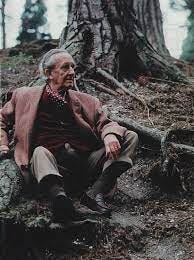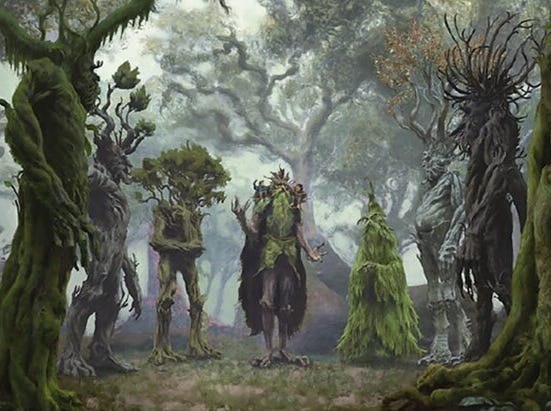On Tolkien: The Blessing of Creation
As we near the end of Laudato Si Week, Jack Heitman reflects on creation through Tolkiens eyes.
J.R.R Tolkien was a Catholic man of many feats – he served his country in the first world war, he was a brother and a father and a husband, he impacted academia as a linguist in the study of English, and he created a fictional world in which millions of people have had the pleasure of exploring through his stories. His creation of stories, and his core beliefs around the essence of creation by humans in general, emanate his Christian spirit. Indeed, he has expressed that he believes the Gospel to be the one true myth and the most important Fairy Story of all mankind.
Tolkien was remarkably opposed to allegory. His Christian views are, instead, shown through the themes and values and emotions that his stories stir in the human heart. It’s easy to miss this with much of Middle Earth being inspired by Nordic mythology and other pagan tales. However, Tolkien himself stated in a letter to his friend Father Robert Murray that,
“The Lord of the Rings is of course a fundamentally religious and Catholic work; unconsciously so at first, but consciously in the revision. That is why I have not put in, or have cut out, practically all references to anything like ‘religion’, to cults or practices, in the imaginary world. For the religious element is absorbed into the story and the symbolism.”
Several themes of Christian theology exist in Tolkien’s most popular works of the Hobbit and the Lord of the Rings including death and resurrection, the battle of good versus evil, the reign of freewill, the power of mercy and pity, the importance of redemption and repentance, and the victory of humility over pride. You can also gain hints of divine providence in the will of the Valar, which are immortal spirit-like entities of the Undying Lands, who urge goodness and action through individuals without interfering with their freewill. There certainly is a vast list of Catholics who have studied and written about Tolkien’s religion in his writing, but central to all of this, and what I entirely intend to focus upon within this article, is Tolkien’s belief that humans are naturally inclined to be creators.
In his lecture titled ‘On Fairy Stories’, he expresses that mankind likes to create, that it is a primary attribute to our state of being, simply because we are created in the image and likeness of our creator God. The very first words of our bible state “In the beginning God created”. Our God is a God that created the heavens and Earth. He separated light from the dark, the seas from the land. He beheld the plants and the birds and the beasts, and humans who would watch over it all. Genesis 1:27 states “So God created man in his own image, in the image of God he created him; male and female he created them.” Reasoning holds that if our God, who himself loves to create, made us perfectly in his image, it is completely justified to believe that it is only natural that we too love to create. Tolkien expressed this concept as ‘sub-creation’. We as humans are not able to create something from nothingness as our God is able to – but we can take things that already exist and shape them into something new. Through this view, we can see the great goodness there is in creation itself. Creation is a goodness that all people can share in and find great benefit in for the health of their souls, minds, and bodies.
…since all existent things depend upon other things for their existence, one can infinitely regress this concept and logically conclude that there must be at least one thing at the beginning of the chain that is not dependent and is thus a Necessary Being.
So, creation is central to all human beings. But why is it important? It is also critical to intertwine and integrate the faith and God into our creations. But why would this be critical?
It is certainly true that we all have a different understanding of what creation is in our own lives. From writing songs, to weaving a sweater, to baking a cake. From a psychological standpoint, creating may be a way of expressing who we are, expressing emotions and feelings that may not so easily be conveyed, or even a way of transferring your inner world to the tangible, physical world. It need not take an artistic form and it may even be as straightforward as creating opportunity for friends and loved ones, making a good meal, or starting a business. Indeed, creation is something different for us all, but there are undoubtfully common themes that run through us as well.
In answering the question of why creation is important and the question of why it is critical to integrate God and the faith, I would like to return to a more essential perspective on the necessary nature of God. The only thing that is necessarily true and real is God. Think, for a moment, on St. Thomas Aquinas’s five proofs of God’s existence. Specifically, in his third proof on the Argument to Necessary being, he relates that since all existent things depend upon other things for their existence, one can infinitely regress this concept and logically conclude that there must be at least one thing at the beginning of the chain that is not dependent and is thus a Necessary Being.
This can be conceived of metaphorically in the existence of darkness ONLY as an absence of light. Light, in the form of photons, is the thing with substance, darkness, on the other hand, is just a lack thereof. So too is cold merely an absence of heat. Once again heat energy is the substance, and cold is just its absence. This holds true for Nothingness – Nothingness is only an absence of a creator, an absence of God. Without God, there is only nothingness. Reality and the universe only exist due to God’s necessary being, and his position as the First Mover in the first proof of Aquinas.
As I wrote previously, God alone can create something from nothing. This is reflected in the Hebrew words Bara and Asah used in the Old Testament of the Bible, both words meaning ‘to create’ or ‘to make’ but the former used specifically for when God is the subject and is first used when his act of creation is from nothing. But through his great work of creating, God shows us that the act of creation is of Goodness and, and in the spirit of humans being created in his likeness, there is not many things that connect us to God as creating does. It is a good act, in its most fundamental of meanings, and it is naturally a part of who we are as humans. In this symmetry, and in God’s purpose for us in freewill, it holds that God wants us to integrate him. He waits on us and invites us to bring him into our lives, and so too does he wish us to allow him to be a part of our creations.
God is infinite. He creates supernovas and galaxies, rainbows and waterfalls, moonlight that shimmers in the rain and the glimmer of frosted snow. He’s there in the soft touch of a summer breeze and the intricately rough bark of trees. He has provided the smell of fresh cut grass and the crash of thunder as clouds join battle when they meet upon the mountain peaks. He created the bite of a mellow wine and the sweetness of a ripe, red strawberry. And of course, he is there in the tears that spill in our sorrows, and the laughter of our brightest joys.
Truly, undeniably, God can create anything He desires whether visible or invisible. But He wants us to create as well, and to do it through Him, and with Him, and in Him. So, when we think about our own works, it is made far more real when God and the faith is integrated into its purpose and conception.
Integrating Him provides an authentic platform to our work. It provides a potent reality to what we do and why we do it. It’s not just about what we want to do, it’s about what we should do and why. It creates a higher sense of importance and guidance of why it should be done in the first place. It makes you wrestle with yourself, wrestle with why you’re creating and how you’re doing it. So, I say, wrestle Jacob as to become Israel.
The fruit of your creation will multiply. What I mean by this is that God still allows for your work’s originally intended purpose (the story to entertain, the job to provide for yourself, and the song to fill a quiet space), but it also allows God to amplify its purpose for his own intent.
Integrating God enables us to be connected and to understand our work on a far deeper level. God, and the Faith through him, is the only necessary reality and thus when enacting your work with God as a catalyst, you and your work and God become connected as one. It bonds us to our work in a way that nothing else can. It provides your work with a sense of purpose beyond your own. It allows your creation to inspire others in ways you intend and in ways you do not directly intend.
Most importantly, in fact paramount to all of this, is that the integration of God into our creation essentially bonds our work to Him, a bond to His greatest gifts of freewill and love. Through this, it helps you to understand God’s love for yourself and for the human family in general, and thus can you dive deeper into your relationship with God. A deeper relationship with God gives you the ability to wholly understand your relationship with others, because now you see from his perspective.
As Tolkien related it to his own work regarding creation, “its object is Art not power, sub-creation not domination and tyrannous re-forming of Creation.” I personally see this to be outstandingly true, for only through God can we overcome the desire to be overly fond of our works where our association of ownership of them becomes pride. The integration of God helps to prevent this pride from forming in the first place. This is demonstrated as well, somewhat ironically, in the Screwtape Letters written by C.S Lewis, where a senior demon writes to his lessor demon in training that, God,
…“wants to bring the man to a state of mind in which he could design the best cathedral in the world, and know it to be the best, and rejoice in the fact, without being any more (or less) glad at having done it than he would be if it had been done by another.”
So how exactly do you integrate God and the Faith into your works? What do I mean by integrate? Does it mean to literally place a cross of frosting on the next cake you bake?
Ask God for his help in your endeavors, and while you do so, be completely intentional with all you do and how you do it
Why yes, it certainly could mean doing something as simple as that, but I should say firstly that the answer to this is purely between you and God. Therefore, to seek this out for yourself, I encourage you to pray.
Thank God for the call to action. Thank God for the challenge and the will to do and to act and to create.
Ask God for his help in your endeavors, and while you do so, be completely intentional with all you do and how you do it. Whatever you create, create it with love. Make it a selfless act so that through it you may help others. Make it to glorify God. You bring praise to God by working hard and by doing a good job, giving it your best effort.
This is key in its relation to mindfulness. God works in the present moment, so ensure that you are yourself living in the moment as well! Living in the moment makes you available to God’s voice and gives God the opportunity to work through you. Stay present- do not overly worry about the past or the future, and trust me, I know how hard this is and that this is much easier said than done.
But indeed, you must consider, deeply, your creation, and think about it through a sacramental lens. If your creation is built with sacramental intention, the product transcends its Earth-bound purpose into a metaphysical reality. What I mean by this is that intentionally creating through, and with, and in the faith may impact even just one person, and in doing so, enables it to bear both a physically real impact and a spiritually real impact.
Creation is a reflection of God’s mercy that you share with others. Creation reflects what God means to you, and with it, every single one of us wields the humble ability to inspire and impact another human life for the better. So, I say to you all, and encourage you thus with the fullest hope of my own heart: Be a part of God’s present plan. Create Goodness and create through Him and through the Faith. We are all just beginning this journey. May he help us in doing so.
By Jack Heitman
Jack T. P. Heitman is an American writer who lives in Scotland after having attended the University of Edinburgh. See him on X @jack_heitman
As we near the end of May we have St Dagnus’s feast on the 29th May appears to have resided in Galloway and as related by St Bede, had little truck with the Bishop of Canterbury. As we head into June we have two of Scotland’s most important Saints and missionaries - St Columba and our patron St Moluag. Have a look at our website to find out more.






